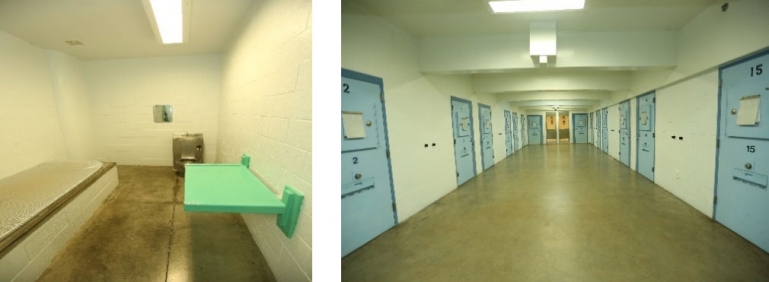- Settlement Agreement and Remedial Plan, Orange County Jail (April 2022)
- Sabot Consulting, Final Expert Report, Orange County Jail (Feb. 5, 2021)
The remedial plan will significantly improve conditions in the Jail system and the County’s treatment of all incarcerated people, including people with disabilities and people who identify as LGBTQ. Highlights of the remedial plan include:
- The County will house LGBTQ incarcerated people in the least restrictive, safe setting. In service of this requirement, the County is creating a pilot “GBTQ+” housing unit, which will have enhanced programming designed specifically for that population.
- The County will house transgender and intersex people in accordance with their stated preference (e.g., male or female housing unit) unless the County has determined, on an individual basis, that such placement would present specific management or security concerns.
- The County will provide at least 24 hours out of cell time per week to incarcerated people. To meet and hopefully exceed this requirement, the County must ensure all of its dayrooms and exercise yards are available and being accessed by incarcerated people all day long. In other words, housing units will not be locked down as a general rule, absent a specific security or emergency situation.
- The County is ending its blanket exclusion of people with disabilities from the Community Work Program, which allows people to work in the community and sleep in their own bed at night. The removal of this disability-based exclusion will expand the use of safe and productive alternatives to incarceration, and put an end to a discriminatory practice.
In addition, under the settlement’s terms, the County has agreed to close the Jail’s 72 hyper-solitary confinement cells, which provide no natural light to people incarcerated there. Instead, the County has created a new Special Management Unit, in which people may be kept for no longer than 30 days, must receive at least two hours out of cell per day, and can obtain additional privileges and early release based on positive behavior. The now-closed confinement cells are pictured below, in photos taken at Theo Lacy Facility in May 2018.

“Through this process, we communicated with hundreds of people held in the Orange County Jail, and we heard again and again about solitary confinement conditions, lack of out-of-cell time, and lack of access to programming for people with disabilities,” said Aaron Fischer, a lawyer who has worked with DRC throughout this investigation. “We expect that this Remedial Plan will address these serious issues in a meaningful way. We appreciate the seriousness with which the Sheriff and his staff, as well as the Jail’s health care leadership, have taken their obligations under the United States Constitution and disability-rights law, and their expressed commitment to implementing real solutions.”
“People who identify as LGBTQ, especially those people who also have a disability, face distinctive and serious forms of harm,” said A.D. Lewis, a DRC attorney who specializes in the intersection of LGBTQ+ and disability-rights law. “Orange County has committed to important changes, and we will be involved every step of the way to ensure successful implementation.”
“Being incarcerated as a trans woman has come with losing privileges, just for being my true self,” said one DRC client who identifies as transgender. “My peers are one of the least violent groups of people, yet are faced with the most restricted rules. LGBTQ housing should not be a punishment.”
“This settlement comes at a moment of urgency and great opportunity,” said Michael Freedman of RBGG. “The Remedial Plan is the result of extensive negotiations that were guided by the input of people with lived experience being incarcerated at the jail. The community should expect significant improvements once the County fully implements the Remedial Plan.”
Selected media coverage:
OC Sheriff’s Department to make landmark changes to its jails for LGBTQ inmates, Orange County Register, April 15, 2022
Orange County agrees to jail reforms for LGBTQ and disabled inmates, Daily Journal, April 18, 2022
Media Contacts
Melody Pomraning
Communications Director
Disability Rights California
(916) 504-5938
Melody.Pomraning@disabilityrightsca.org
Disability Rights California (DRC) – Is the agency designated under federal law to protect and advocate for the rights of Californians with disabilities. The mission of DRC is to defend, advance, and strengthen the rights and opportunities of people with disabilities. For more information visit: https://www.disabilityrightsca.org.
Law Office of Aaron J. Fischer represents clients on issues related to civil rights, disability rights, and complex litigation, with experience monitoring public and private entities to ensure legal compliance. The firm is founded upon a commitment to justice and to practical problem-solving.
Rosen Bien Galvan & Grunfeld is a litigation boutique in San Francisco, California that has decades of experience litigating to protect the rights of incarcerated people in jails and prisons in California.
